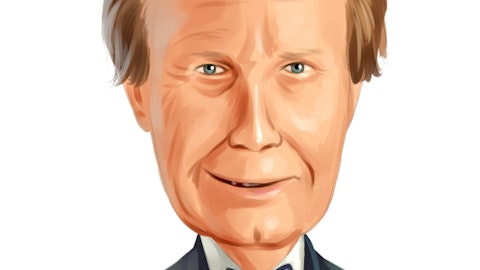Lou Salamone: And that I would say right now, when we look at going forward. We do our modeling based on where prices are, we’re not looking at any great decreased inflation and et cetera. While we’ve done a little better than inflation, our supply chain guys have done a good job. As we model out and see where we can still be in the 100 to 120 range, that’s based on, as Kenny said, really current pricing conditions et cetera. So there could be upside, but I think we just have to wait and see what happens in the economy.
Brent Thielman: Understood. And then, just a quick follow-on the
Lou Salamone: Brent, you’re breaking up. It’s very hard for us to understand your — if you can sort of change where you’re sitting or something but
Brent Thielman: Yeah. Can you hear me well?
Lou Salamone: Right now, we can. Go ahead, Brent.
Brent Thielman: If you can hear me. Yeah, just a follow up on the sequence that the EBITDA for through fourth quarter. Maybe just your expectations for cash flow the year in comparability with the kind of business right now?
Lou Salamone: Brent, I really apologize, but we’re getting maybe every third word of your question.
Brent Thielman: Okay. I apologize., Thanks guys.
Lou Salamone: Yeah, follow-up right after the call. I apologize, but we can’t get you — what you’re saying.
Operator: Apologies for that Brent. We’ll now move on to our final question, which comes from the line of Alex Rygiel with B Riley. Alex, please go ahead.
Alex Rygiel: Thank you. Good morning, gentlemen and very nice quarter. In totality, can you talk about the opportunity with Fidelis, the multiple project opportunities of project cycles? And how that might flow through backlog over time?
Kenny Young: Yeah. None of the Fidelis projects that were — obviously, they are in our pipeline, but they’re not in our backlog yet materially. We’ve got some minor engineering revenues, it seems like that here and there with them. But the larger projects are not in there yet at this point in time. Fidelis is — they’re finalizing their funding aspects around the grown projects. We’re very close to that process. And I think, as we described, it would be potential bookings towards the end of this year and I think we’re all on track on that. We’ll have, obviously, probably through the summer time some further announcements on that publicly, that we put out on timing and updates as it relates to Fidelis, but fully anticipate that anyway.
But that’s how we’re tracking it. So I would look at it at the end of the year more, obviously, it’s going to be a three-year project. I think they’re targeting that facility to be up and running by early 2026, something like that. The other Fidelis is also we’re working with them on some other opportunities and some of those are around hydrogen and some of those are in carbon capture projects and we’re excited to be a part and closer with them on those opportunities. Some of those have had good potential and I would imagine we might be working with them on some engineering studies and things on those projects even over the course of the next few months. Again, nothing material, but they have a number of projects that are involved in globally.
And so we’re definitely excited about that to be a part of that. So I know if that helps Alex, but that’s how we’re thinking about it.
Alex Rygiel: No, that does. And then coming back to the supply chain challenges and understanding that every project contract is different. Are you able to pass along some of — if not all of the kind of unanticipated costs, talk us through that a little bit.




